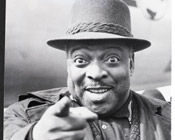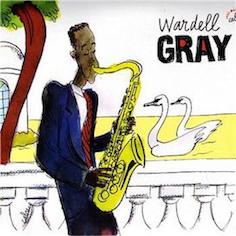¤ Count Basie [1904-1984]
Count Basie was among the most important bandleaders of the swing era. With the exception of a brief period in the early ’50s, he led a big band from 1935 until his death almost 50 years later. Basie’s orchestra was characterized by a light, swinging rhythm section that he led from the piano, lively ensemble work, and generous soloing. Basie was not a composer like Duke Ellington or an important soloist like Benny Goodman. His instrument was his band, which was considered the epitome of swing and became broadly influential on jazz.
With the exception of a brief period in the early ’50s, he led a big band from 1935 until his death almost 50 years later. Basie’s orchestra was characterized by a light, swinging rhythm section that he led from the piano, lively ensemble work, and generous soloing. Basie was not a composer like Duke Ellington or an important soloist like Benny Goodman. His instrument was his band, which was considered the epitome of swing and became broadly influential on jazz.
∇ ‘All Of Me’ ⇓ (1965)
♦ ‘In a Mellow Tone’ [1981] ⇓ (D. Ellington)
∞→ Oscar Peterson & Count Basie ↓ ‘Slow Blues’
∇ w/ Helen Humes ⇓ ‘I Cried for You’
• ‘Who Me?’ ↓ [«Chairman Of The Board»_1959]
∇ ‘Jumpin’ at the Woodside’ ⇓
÷ ÷ ÷ ÷
∇ Wardell Gray ⇓ ‘Forgotten Tenor’ [1921-1955]
 ←Born in Oklahoma City in 1921, Wardell moved to Detroit where he studied music at Cass Tech High. After playing with the local bands of Jimmy Rachel and Benny Carew, he did his first name band work with Earl Hines, doubling on tenor and clarinet from 1943 to 1945. Then he was with Billy Eckstine‘s big band for a short spell before joining Benny Carter in 1946 […] With Carter, Wardell went out to the West coast and decided to remain for a while, participating in many of the jazz concerts so popular there at that time, often times with Dexter Gordonand Sonny Criss…
←Born in Oklahoma City in 1921, Wardell moved to Detroit where he studied music at Cass Tech High. After playing with the local bands of Jimmy Rachel and Benny Carew, he did his first name band work with Earl Hines, doubling on tenor and clarinet from 1943 to 1945. Then he was with Billy Eckstine‘s big band for a short spell before joining Benny Carter in 1946 […] With Carter, Wardell went out to the West coast and decided to remain for a while, participating in many of the jazz concerts so popular there at that time, often times with Dexter Gordonand Sonny Criss…
The Lester Young style he had shown with Hines was still in evidence, a pure-toned driving style which underwent change in the following year. When Wardell came to New York in 1948 to become part of the Benny Goodman Sextet you could hear the shift to Charlie Parker’s influence. Later that year he appeared at the Royal Roost with Tadd Dameron‘s group and Count Basie‘s band. In 1949 it was back to Goodman, this time the big band. By the time he had finished an engagement at the Orchid Club (the old Onyx) on 52nd Street with Sonny Stitt in early 1950, Wardell’s style had changed completely over to the harder sound and crisper attack. «Twisted» from 1949.
He returned to Detroit and spent several months there with his own quartet. When Count Basie formed a small band, Wardell answered his call. Until the end of 1951 when he settled in California, he played intermittently with Count in both small and large groups. We never saw him in the East after that. Outside of a few recording sessions he wasn’t heard from. The West Coast may have been booming, but not for all.
Whatever he played swung, for primarily Wardell was a swinger. Moving along at up-tempo, he would still exhort the rhythm section to «bear down.»
–IRA GITLER, from the liner notes, Wardell Gray Memorial, Prestige.
÷ ÷ ÷ ÷
¤ Duke Ellington [1899-1974]
 A major figure in the history of jazz music, Duke Ellington‘s career spanned more than half a century, during which time he composed thousands of songs for the stage, screen and contemporary songbook. He created one of the most distinctive ensemble sounds in Western music and continued to play what he called «American Music» until shortly before his death in 1974.
A major figure in the history of jazz music, Duke Ellington‘s career spanned more than half a century, during which time he composed thousands of songs for the stage, screen and contemporary songbook. He created one of the most distinctive ensemble sounds in Western music and continued to play what he called «American Music» until shortly before his death in 1974.
• Early Life
Born on April 29, 1899, Duke Ellington was raised by two talented, musical parents in a middle-class neighborhood of Washington DC. At the age of 7, he began studying piano and earned the nickname «Duke» for his gentlemanly ways. Inspired by his job as a soda jerk, he wrote his first composition, «Soda Fountain Rag,» at the age of 15. Despite being awarded an art scholarship to the Pratt Institute in Brooklyn, New York, Ellington followed his passion for ragtime and began to play professionally at age 17.
• Professional Life
In the 1920s, Ellington performed in Broadway nightclubs as the bandleader of a sextet, a group which in time grew to a 10-piece ensemble. Ellington sought out musicians with unique playing styles, such as Bubber Miley, who used a plunger to make the «wa-wa» sound, and Joe Nanton, who gave the world his trombone «growl.» At various times, his ensemble included the trumpeter Cootie Williams, cornetist Rex Stewart and alto saxophonist Johnny Hodges. Ellington made hundreds of recordings with his bands, appeared in films and on radio, and toured Europe on two occasions in the 1930s.
Ellington’s fame rose to the rafters in the 1940s when he composed several masterworks, including «Concerto for Cootie,» «Cotton Tail» and «Ko-Ko.» Some of his most popular songs included «It Don’t Mean a Thing if It Ain’t Got That Swing,» «Sophisticated Lady,» «Prelude to a Kiss,» «Solitude,» and «Satin Doll.» A number of his hits were sung by the impressive Ivie Anderson, a favorite female vocalist of Duke’s band.
It was Ellington’s sense of musical drama that made him stand out. His blend of melodies, rhythms and subtle sonic movements gave audiences a new experience—complex yet accessible jazz that made the heart swing. Ellington’s autobiography, Music Is My Mistress, was published in 1973. Ellington earned 12 Grammy awards from 1959 to 2000, nine while he was alive.
• Death
On May 24, 1974, at the age of 75, Duke Ellington died of lung cancer and pneumonia. His last words were, «Music is how I live, why I live and how I will be remembered.»
[from . . . http://www.biography.com/people/duke-ellington-9286338]
♦ ‘Isfahan’ ↓ «Far East Suite» [featuring . . . Johnny Hodges]
◊ ‘In my solitude’ ↓ (voice & trumpet = Louis Armstrong)
In my solitude you haunt me with reveries of days gone by In my solitude you taunt me with memories that never die I sit in my chair – Filled with despair – Nobody could be so sadWith gloom ev’rywhere – I sit and I stare – I know that I’ll soon go mad In my solitude, I’m praying … Dear Lord above – Send back my love
♥ Sarah Vaughan: ‘I Let A Song Go Out Of My Heart’ ⇓ [1979]
It was the sweetest melody
life doesn’t mean a thing to me
You know that we were meant to be
Believe me darling when I say
♦ ‘In a mellow tone’ ↓ [1985]
In a mellow tone feeling fancy free
And I’m not alone, I’ve got sympathy
Everything’s okay the live long day
With this mellow song I can’t go wrong
In a mellow tone that’s the way to live
If you mope and groan something’s gotta give
Just laugh and play the whole day
There’s joy unknown in a mellow tone
In a mellow tone . . .
♦→ ‘It don’t mean a thing’ ↓ [1943]
It don’t mean a thing if it ain’t got that swing . . .
Well it don’t mean a thing all you got to do is sing
It makes no difference if it’s sweet or hot
Just give that rhythm every little thing you got
≈ ≈
∇ ‘I got it bad (and that ain’t good)’ ⇓ [voice: Ivie Anderson]
Never treats me sweet and gentle the way he should; I Got It Bad And That Ain’t Good! My poor heart is sentimental not made of wood I Got It Bad And That Ain’t Good! But when the week is over and Friday rolls aroun’ my man and me, we feel some and [. . .?] some, and then some He don’t love me like I love him – nobody could I Got It Bad And That Ain’t Good Like a lonely weeping willow lost in the wood Lord, I Got It Bad And That Ain’t Good!♦ ◊ ‘Duke’s Place’ ↓
Baby, take me down to Duke’s Place Wildest box in town is Duke’s Place Love that piano sound in Duke’s PlaceSaxes do their tricks in Duke’s Place Fellas swing their chicks in Duke’s Place Come on, get your kicks in Duke’s Place Take it, Duke . . . If you’ve never been to Duke’s Place Take your tootsies into Duke’s Place Life is in a spin in Duke’s Place Baby, take me down to Duke’s Place
Wildest place in town is Duke’s Place
Crazy sound you’ll hear in Duke’s Place Come on swing it down on Duke’s Place
Come on sing that song at Duke’s Place
Piano sound unique in Duke’s Place You get yourself a chick, and then you’re really sick
You grab yourself a table and look around and holler, «Waiter, c’mon and give me, give me, give a place
Let me sit down by that table, I wanna hear Duke» Baby swinging down in Duke’s Place
Come on get that kick on Duke’s Place
Swing it, swing it down at Duke’s Place . . .
•→ ‘Cotton Tail’ ⇐ [«Hot Chocolate»_1941]
♦ C Jam Blues ↓ (1942)
· · · featuring (in order of appearance):
… Ray Nance, Rex Stewart, Ben Webster, Joe Nanton, Barney Bigard & Sonny Greer
♣ Copenhagen ↓ 1967
∞ Duke Ellington & John Coltrane ↓ ‘In a Sentimental Mood’← [1963]
♥ Peggy Lee + Sarah Vaughan + Aretha Franklin + Roberta Flack ↓ [1973]
Ain’t got the change of a nickel – Ain’t got no bounce in my shoes
Ain’t go no fancy to tickle – I ain’t got nothing but the blues
Ain’t got a dream that is working – I ain’t got nothing but the blues
With gloom ev’rywhere – I sit and I stare – I know that I’ll soon go mad
Ain’t got no rest in my slumbers – Ain’t got no feelings to bruise
Ain’t got no telephone numbers – I ain’t got nothing but rocks in my bed
My poor heart is sentimental, not made of wood
I got it bad, and that ain’t good
But when the weekend’s over and Monday rolls around
I end up like a […?] crying my heart out, lord above me
Make him love me the way he should
I got it bad, and that ain’t good . . .




Deja un comentario